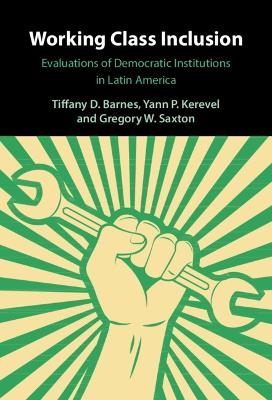
Working Class Inclusion
Cambridge University Press (Verlag)
978-1-009-34981-9 (ISBN)
Latin American legislators, like legislators worldwide, are drawn from a narrow set of elites who are largely out of touch with average citizens. Despite comprising the vast majority of the labor force, working-class people represent a small slice of the legislature. Working Class Inclusion examines how the near exclusion of working-class citizens from legislatures affects citizens' evaluations of government. Combining surveys from across Latin America with novel data on legislators' class backgrounds and experiments from Argentina and Mexico, the book demonstrates voters want more workers in office, and when combined with policy representation, the presence of working-class legislators improves citizens' evaluations of government. Absent policy representation, however, workers are met with distrust and backlash. Chapters show citizens have many opportunities to learn about the presence, or absence, of workers; and the relationship between working-class representation and evaluations of government is strongest among citizens who are aware of legislators' class status.
Tiffany D. Barnes is a Professor of Political Science at University of Kentucky. Her first book, Gendering Legislative Behavior: Institutional Constraints and Collaboration (2016), won the Alan Rosenthal Prize from the Legislative Studies Section of the American Political Science Association in 2017. Yann P. Kerevel is Associate Professor of Political Science at Louisiana State University. He has published numerous articles in Journal of Politics, Comparative Political Studies, Legislative Studies Quarterly, Political Research Quarterly, Electoral Studies, Latin American Politics & Society, among others. Gregory W. Saxton is a Senior Lecturer at Texas Tech University. His research appears in Governance, Political Research Quarterly, Journal of Elections, Public Opinion and Policy, Latin American Politics and Society, and Politics, Groups, and Identities, among others.
1. Introduction; 2. A Theory of Working-Class Inclusion; 3. Do Voters Want to Be Represented by Workers?; 4. Will Any Worker Do? The Role of Policy in Linking Workers' Presence to Evaluations of Representatives; 5. Will Any Worker Do? Linking Parties to Workers in Argentina and Mexico; 6. How Do Voters Know Workers Are in Office? Political Incentives, Journalistic Dissemination, and People's Ability to Intuit Class; 7. How Do Voters Know Workers Are in Office? Interest in Politics, News Consumption, and Evaluations of Institutions; 8. Conclusion.
| Erscheinungsdatum | 31.10.2023 |
|---|---|
| Zusatzinfo | Worked examples or Exercises |
| Verlagsort | Cambridge |
| Sprache | englisch |
| Maße | 158 x 235 mm |
| Gewicht | 550 g |
| Themenwelt | Sozialwissenschaften ► Ethnologie |
| Sozialwissenschaften ► Politik / Verwaltung ► Staat / Verwaltung | |
| Sozialwissenschaften ► Politik / Verwaltung ► Vergleichende Politikwissenschaften | |
| Sozialwissenschaften ► Soziologie | |
| ISBN-10 | 1-009-34981-3 / 1009349813 |
| ISBN-13 | 978-1-009-34981-9 / 9781009349819 |
| Zustand | Neuware |
| Informationen gemäß Produktsicherheitsverordnung (GPSR) | |
| Haben Sie eine Frage zum Produkt? |
aus dem Bereich


